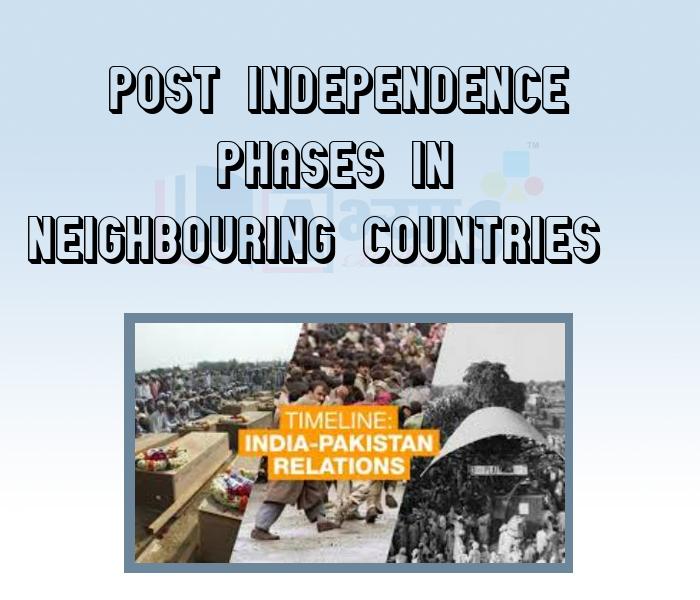Post Independence Phases in Neighbouring Countries













Post Independence Phases in Neighbouring Countries
Post-Independence Phases in Neighbouring Countries: During the l98Os and 1990s, many changes took place in the democracies of our neighbouring countries. In Pakistan and Bangladesh, transition from army rule to democracy took place in the 1990s. However, in 1999, General Musharraf brought back the army rule in Pakistan. In Nepal, the king gave up many of his powers - constitutional monarch to guide elected leader- new king of Nepal dismissed the elected govern— back political freedoms of people won in 1990’s.Nepal is still struggling with its unexperienced democracy. This phase of transition is continuing in other countries of the world turning to democracy. By 2005, about 140 countries of the world were holding multi-party elections. After 1980,more than 80 non-democratic countries have made significant advances towards democracy. But still there are many countries where people are not free to express themselves. They can not elect their leaders and also are not free to take big decisions about their present and future life.
Struggle in Myanmar: Myanmar (previously known as Burma) gained freedom from colonial rule in 1948 and became a democracy. But the democratic rule ended in 1962 with a military coup. In 1990, elections were help for the first time after almost 30 years. The national League for Democracy (NLD) led by Aung San Suu Kyi, won the elctions. But the military leaders of Myanmar refused to recognize the election results.
The military government put the elected pro-democracy leaders including Aung San Suu Kyi under house arrest. In Myanmar, the military accused political activists for most trivial offences and jailed them. If anyone was found issuing statements publicly against the regime, the person was sentenced to 20 years in prison. Due to such brutal and violent policies of the military-ruled n Myanmar, around 6 to 10 lakh people left their country. Suu Kyi kept on fighting for democracy and freedom for her homeland. She spent a long time under house arrest. Her struggle has won international recognition. She was awarded the Nobel Peace Prize in 1991. Yet the people in Myanmar are still struggling to establish a democratic government in their country.
Aung San Suu Kyi belongs to ________________ | |||
| Right Option : C | |||
| View Explanation | |||
Which country is not a true democratic country? | |||
| Right Option : C | |||
| View Explanation | |||
Which award has been won by Aung San Suu Kyi? | |||
| Right Option : C | |||
| View Explanation | |||
Students / Parents Reviews [10]
Abhyas is a complete education Institute. Here extreme care is taken by teacher with the help of regular exam. Extra classes also conducted by the institute, if the student is weak.

Om Umang
10thAbout Abhyas metholodology the teachers are very nice and hardworking toward students.The Centre Head Mrs Anu Sethi is also a brilliant teacher.Abhyas has taught me how to overcome problems and has always taken my doubts and suppoeted me.

Shreya Shrivastava
8thIt was good as the experience because as we had come here we had been improved in a such envirnment created here.Extra is taught which is beneficial for future.

Eshan Arora
8thA marvelous experience with Abhyas. I am glad to share that my ward has achieved more than enough at the Ambala ABHYAS centre. Years have passed on and more and more he has gained. May the centre flourish and develop day by day by the grace of God.

Archit Segal
7thBeing a parent, I saw my daughter improvement in her studies by seeing a good result in all day to day compititive exam TMO, NSO, IEO etc and as well as studies. I have got a fruitful result from my daughter.

Prisha Gupta
8thAbhyas Methodology is very good. It is based on according to student and each child manages accordingly to its properly. Methodology has improved the abilities of students to shine them in future.

Manish Kumar
10thIt was a good experience with Abhyas Academy. I even faced problems in starting but slowly and steadily overcomed. Especially reasoning classes helped me a lot.

Cheshta
10thMy experience with Abhyas is very good. I have learnt many things here like vedic maths and reasoning also. Teachers here first take our doubts and then there are assignments to verify our weak points.

Shivam Rana
7thOne of the best institutes to develope a child interest in studies.Provides SST and English knowledge also unlike other institutes. Teachers are co operative and friendly online tests andPPT develope practical knowledge also.

Aman Kumar Shrivastava
10thIt has a great methodology. Students here can get analysis to their test quickly.We can learn easily through PPTs and the testing methods are good. We know that where we have to practice
